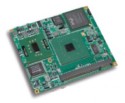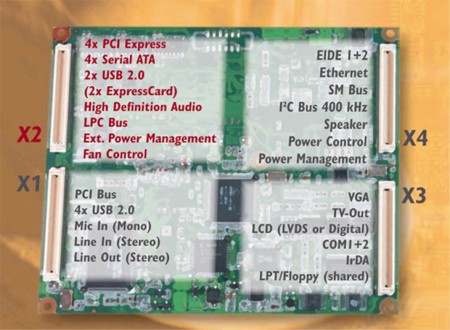XTX gains a high-profile advocate
Feb 27, 2006 — by LinuxDevices Staff — from the LinuxDevices Archive — 13 views Embedded PC pioneer Ampro Computers Inc. has added another arrow to its form-factor quiver, with the introduction of its first module in XTX format, an extension to the popular ETX computer-on-module (COM) standard. The XTX 820 is based on Pentium/Celeron M processors, and supports embedded Linux, among other embedded OSes.
Embedded PC pioneer Ampro Computers Inc. has added another arrow to its form-factor quiver, with the introduction of its first module in XTX format, an extension to the popular ETX computer-on-module (COM) standard. The XTX 820 is based on Pentium/Celeron M processors, and supports embedded Linux, among other embedded OSes.
According to Ampro, XTX (eXpress Technology for ETX) extends the life of ETX by combining “legacy peripherals” with high speed serial technologies, PCI Express, and serial ATA. In many cases, XTX can allow companies to upgrade ETX-based product designs without redesigning their custom application baseboards, the company claims.
The XTX 820 computer-on-module (COM) is offered with a choice of processors ranging from a 1 GHz ultra-low voltage Celeron to a 1.8 GHz Pentium M with up to 1 GB of DDR SDRAM. Other key listed features and specifications include:
- Processor:
- 1.0 GHz Ultra Low Voltage Celeron M 373
- 1.4 GHz Low Voltage Pentium M 738
- 1.8 GHz Pentium M 745
- Onboard memory — up to 1 GB DDR2 400 SODIMM
- Display controller — integrated Intel GMA 900
- AGP 256-bit 3D engine
- up to 2048×1536 resolution
- up to 224 MB DVMT frame buffer
- dual-channel LVDS flat panel support
- TV Out
- Storage:
- single PCI-bus enhanced Ultra DMA 33/66/100 synchronous IDE interface supports up to two hard drives
- 2 serial ATA ports
- I/O ports:
- 10/100 BaseT Ethernet
- 6 USB 2.0
- 2 serial
- PS/2 keyboard and mouse
- EPP/ECP bidirectional parallel port
- AC97 audio, speaker, mic, headphone
- BIOS — AMI with ACPI 2.0 support including S3 suspend-to-RAM state
“We understand how much OEMs have invested in custom baseboards,” said Ampro's CEO Joanne Mumola Williams. “Consequently Ampro is joining other key suppliers committed to XTX to further strengthen this new industry standard in order to provide the cleanest path forward for OEMs to adopt new processors and chipsets.”
About XTX
The XTX (eXpress Technology for ETX) standard was unveiled early last year by German single-board computer vendor Congatec. According to the XTX Consortium, which currently maintains the XTX spec, XTX provides an expansion and continuation of the well-established ETX standard by maintaining the same four baseboard connector types and locations as ETX, but replacing the ISA bus on the “X2” connector with four PCI Express lanes, two Serial ATA ports, two additional USB ports, and the Low Pin Count (LPC) bus.

XTX connector allocation
(Source: Congatec)
For ETX-based system designs that do not make use of ETX's ISA bus signals, XTX modules can plug directly into existing application baseboards, Ampro explains. If ISA bus signals are needed, however, either a PCI-to-ISA or an LPC-to-ISA bridge can be added to the baseboard design.
The LPC bus, created by Intel, is used in PCs to connect low bandwidth peripherals such as the boot ROM, “legacy” PC-style I/O devices, and audio controllers to the CPU. LPC has largely replaced the ISA bus in current-generation PC chipsets, according to Ampro.
The XTX Consortium currently lists seven “participating members” and eight “supporting members.” Significantly, Kontron, inventor of ETX, is not listed. Kontron, meanwhile, has adopted a different approach to next-generation COMs with ETXexpress, which is not compatible with ETX. ETXexpress, in turn, has morphed into COM Express, under the auspices of PICMG (the PCI Industrial Computer Manufacturers Group).
Comparison of COM standards
Ampro provided the following comparison among ETX and its two PCI Express extensions, XTX and COM Express:
| ETX | XTX | COM Express | |
| Legacy support: | Full legacy | Legacy except ISA | No legacy |
| Ethernet support | 10/100 | 10/100 | 10/100, GigE |
| IDE support: | 2 IDE | 2 IDE, SATA | SATA |
| USB support: | 4 USB | 6 USB | 6 USB |
Notes:
|
|||
In addition to XTX, Ampro plans to support COM Express “as soon as it stabilizes a bit more,” according to Colin McCracken, Ampro's director of marketing for boards.
“At the moment, there are five incompatible pinout definitions and two sizes (with a third on the way), making interchangeability and second-sourcing of modules an exercise for OEMs to determine,” McCracken told LinuxDevices.com. “Ampro believes that several of the 15 (5 x 3) types will settle out by the end of 2006, which would be a good time for OEMs to start designs.”
As to preference, McCracken added, “Ampro does not prefer one over the other; they are both useful for different purposes. XTX is for OEMs who have existing ETX baseboards, since it reuses the mechanicals (same module size and same baseboard connectors) and replaces the ISA bus with PCI Express, Serial ATA, LPC bus, and two more USB ports. COM Express is useful for brand new designs that don't require legacy bus or I/O, since the mechanicals are different from ETX/XTX (different modules sizes and different baseboard connectors). XTX is a smooth migration, preserving legacy I/O and mechanicals, while COM Express requires a complete baseboard redesign. However, COM Express has up to 32 lanes of PCI Express and therefore it is well-situated for high I/O performance designs.”
McCracken said that Ampro plans to release its first COM Express processor module by the end of 2006.
XTX820 availability
RoHS-compliant production XTX 820 modules will be available in March, according to Ampro, with prices starting in the “low $500s in moderate quantities.”
This article was originally published on LinuxDevices.com and has been donated to the open source community by QuinStreet Inc. Please visit LinuxToday.com for up-to-date news and articles about Linux and open source.